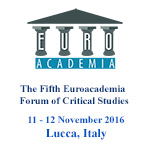Euroacademia Conferences
 Europe Inside-Out: Europe and Europeanness Exposed to Plural Observers (9th Edition) April 24 - 25, 2020
Europe Inside-Out: Europe and Europeanness Exposed to Plural Observers (9th Edition) April 24 - 25, 2020 Identities and Identifications: Politicized Uses of Collective Identities (9th Edition) June 12 - 13, 2020
Identities and Identifications: Politicized Uses of Collective Identities (9th Edition) June 12 - 13, 2020 8th Forum of Critical Studies: Asking Big Questions Again January 24 - 25, 2020
8th Forum of Critical Studies: Asking Big Questions Again January 24 - 25, 2020 Re-Inventing Eastern Europe (7th Edition) December 13 - 14, 2019
Re-Inventing Eastern Europe (7th Edition) December 13 - 14, 2019 The European Union and the Politicization of Europe (8th Edition) October 25 - 26, 2019
The European Union and the Politicization of Europe (8th Edition) October 25 - 26, 2019 Identities and Identifications: Politicized Uses of Collective Identities (8th Edition) June 28 - 29, 2019
Identities and Identifications: Politicized Uses of Collective Identities (8th Edition) June 28 - 29, 2019 The European Union and the Politicization of Europe (7th Edition) January 25 - 26, 2019
The European Union and the Politicization of Europe (7th Edition) January 25 - 26, 2019 7th Forum of Critical Studies: Asking Big Questions Again November 23 - 24, 2018
7th Forum of Critical Studies: Asking Big Questions Again November 23 - 24, 2018 Europe Inside-Out: Europe and Europeanness Exposed to Plural Observers (8th Edition) September 28 - 30, 2018
Europe Inside-Out: Europe and Europeanness Exposed to Plural Observers (8th Edition) September 28 - 30, 2018 Identities and Identifications: Politicized Uses of Collective Identities (7th Edition) June 14 - 15, 2018
Identities and Identifications: Politicized Uses of Collective Identities (7th Edition) June 14 - 15, 2018
Possessing the Concept of Development: Critical Perception of the Developmental Narratives?
-
-

-
Presentation speakers
- Magdalena Kania, Jagiellonian University, Cracow, Poland
Abstract:
The notion of international development, which emerged after II World War, has been accelerated in 60s after massive independence declarations in the so called third world, former European colonies. Perceived as s a quasi-moral obligation to support the global growth, the processes of development assistance have been implemented in official policies of states, international organizations and institutions. This paper examines the shift in developmental thinking since the early concepts of Modernization theory, independence theories through liberal projects of structural adjustment, until the most recent post-9/11 developmental theories linking development with security. In the first part, the author analyzes different meanings of development within the framework of mainstream theories of development and their political and discursive correlates in the official public narratives on developing countries. The paper examines how the notion of ‘underdevelopment’ evolved to ‘developing’ and how the political angle has been replaced by economic determinants. The second part of the paper shows the critical perception of mainstream theories, labelled as post-development narratives. Basing on the works of Michel Foucault, Mark Duffield and others, the paper presents how the concept of ‘underdevelopment’/'developing’ has been produced in general language and thinking of former colonies, mainly in Africa. The real effect of those discursive practices was to anchor the notion of underdevelopment in the overall perception of former colonies, now called as developing world. The preservation of developing discourse slowly became new regime of true. The ambiguity and lack of consensus of appropriate mechanisms, policies served as parallel and detached aspect of development, which became nothing more but teleological and abstract concept, not possible to reach with the realistic circumstances.
-
Related Presentations

Noumenism
- Heidi Dinkler













